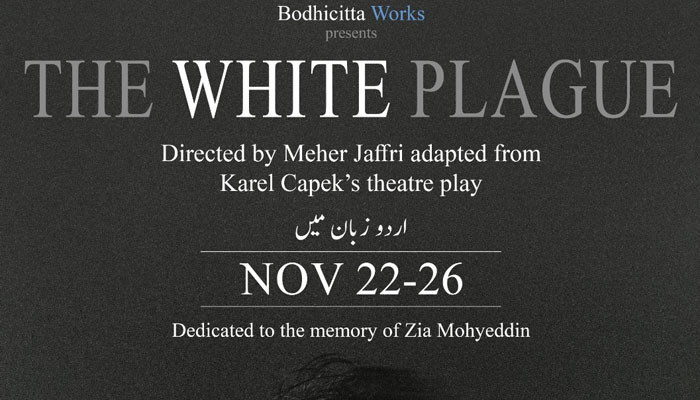A case of crowd’s madness under spell of populist narrative
The Arts Council of Pakistan (ACP) has been staging an Urdu adaptation of ‘The White Plague’, a satirical play originally written by Czech author Karel apek in 1937, a couple of years before the Second World War started.
Although the play was written several decades ago, it appeared still relevant to the present day for multiple reasons. Firstly, its plot dealt with a pandemic. Secondly, it was about warmongering that continues today in many parts of the world, particularly where fascist regimes are holding sway.
The play is set in a fictional country being controlled by a military dictator, Marshal, played by Saad Zameer, who is a close reminiscent of a Nazi leader. The country is plagued by leprosy. People are dying and there is no cure available, especially for the poor.
Contesting the belief that social classes are ordained by God, the play plants an important question into the audience’s mind in the beginning: “What kind of God that is who vents out their anger on the poor?”
The rest of the play attempts to answer this question by shedding light on the human greed for fame, power and money, which results in neglecting greater public interests on the pretext of patriotism and economic indicators.
A selfish Dr Sigelius, played by Fawad Khan, who rubs shoulder with society elites and brags about his scientific work against incurable leprosy asserts that all people over 45 would die in the pandemic. In contrast, a dove Dr Gulen, played by Abdul Rehman, has found a cure of the disease, but he is not willing to treat the affluent until they drop their support for the imminent war that, in his belief, would kill many more people than leprosy.
Dr Sigelius tries to subdue Dr Gulen into giving him the formula for the cure, but he does not succumb to pressure and continues to treat the underprivileged people only, refusing monetary offers that come his way.
When Seth Sahib, the owner of a factory that produces artillery, gets affected by the disease, he reaches Dr Gulen for the treatment. Dr Gulen puts a condition before him, which is stopping the production for war.
Eventually, Marshal, who claimed to be immune from everything bad being assigned a divine mission, also contracts the disease. Conceding to Dr Gulen’s demand is not easy for him but when he realises that in order to save himself, he must withdraw from the war, Dr Gulen agrees to treat him. However, before the doctor could bring his vaccine to the dictator, he is lynched by a mob that wants war.
The ending suggests that the dictator would die falling prey to the narrative of war that he propagated in the public. However, the public would also suffer the same fate, which made the ending all tragic.
All the cast performed well but Dr Gulen was played excellently by Rehman who is surely a promising actor. They play, directed by Meher Jaffri, will continue till November 26.
-
 Winter Olympics 2026: Top Contenders Poised To Win Gold In Women’s Figure Skating
Winter Olympics 2026: Top Contenders Poised To Win Gold In Women’s Figure Skating -
 Inside The Moment King Charles Put Prince William In His Place For Speaking Against Andrew
Inside The Moment King Charles Put Prince William In His Place For Speaking Against Andrew -
 Will AI Take Your Job After Graduation? Here’s What Research Really Says
Will AI Take Your Job After Graduation? Here’s What Research Really Says -
 California Cop Accused Of Using Bogus 911 Calls To Reach Ex-partner
California Cop Accused Of Using Bogus 911 Calls To Reach Ex-partner -
 AI Film School Trains Hollywood's Next Generation Of Filmmakers
AI Film School Trains Hollywood's Next Generation Of Filmmakers -
 Royal Expert Claims Meghan Markle Is 'running Out Of Friends'
Royal Expert Claims Meghan Markle Is 'running Out Of Friends' -
 Bruno Mars' Valentine's Day Surprise Labelled 'classy Promo Move'
Bruno Mars' Valentine's Day Surprise Labelled 'classy Promo Move' -
 Ed Sheeran Shares His Trick Of Turning Bad Memories Into Happy Ones
Ed Sheeran Shares His Trick Of Turning Bad Memories Into Happy Ones -
 Teyana Taylor Reflects On Her Friendship With Julia Roberts
Teyana Taylor Reflects On Her Friendship With Julia Roberts -
 Bright Green Comet C/2024 E1 Nears Closest Approach Before Leaving Solar System
Bright Green Comet C/2024 E1 Nears Closest Approach Before Leaving Solar System -
 Meghan Markle Warns Prince Harry As Royal Family Lands In 'biggest Crises' Since Death Of Princess Diana
Meghan Markle Warns Prince Harry As Royal Family Lands In 'biggest Crises' Since Death Of Princess Diana -
 Elon Musk Weighs Parenthood Against AI Boom, Sparking Public Debate
Elon Musk Weighs Parenthood Against AI Boom, Sparking Public Debate -
 'Elderly' Nanny Arrested By ICE Outside Employer's Home, Freed After Judge's Order
'Elderly' Nanny Arrested By ICE Outside Employer's Home, Freed After Judge's Order -
 Keke Palmer On Managing Growing Career With 2-year-old Son: 'It's A Lot'
Keke Palmer On Managing Growing Career With 2-year-old Son: 'It's A Lot' -
 Key Details From Germany's Multimillion-euro Heist Revealed
Key Details From Germany's Multimillion-euro Heist Revealed -
 David E. Kelley Breaks Vow To Cast Wife Michelle Pfeiffer In 'Margo's Got Money Troubles'
David E. Kelley Breaks Vow To Cast Wife Michelle Pfeiffer In 'Margo's Got Money Troubles'




